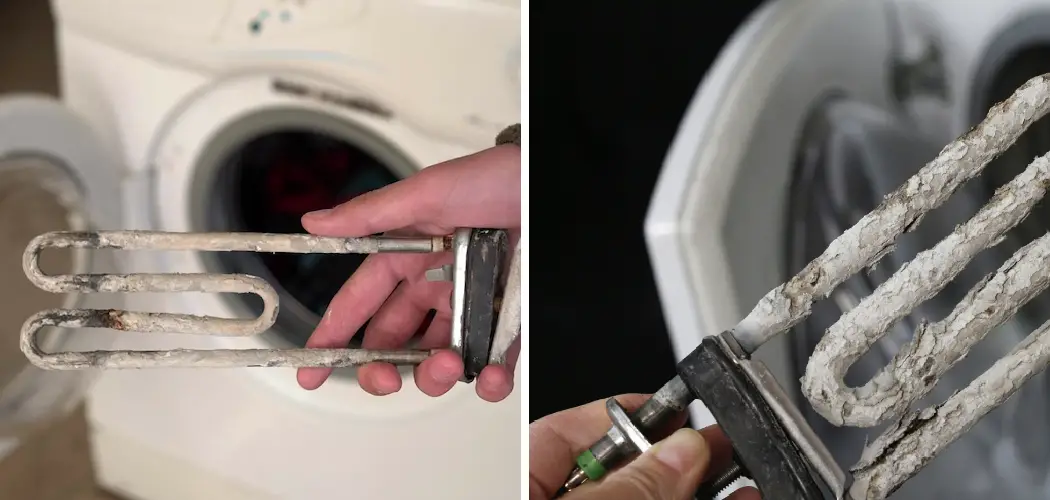A water heater is essential in every household, but it can start acting up over time due to calcium buildup. Calcium buildup is one of the most common problems that plague water heaters, and it can lead to a variety of problems, such as reduced efficiency, decreased hot water supply, and even corroded pipes. Fortunately, preventing calcium buildup is relatively simple and can save you from costly repairs and replacements.
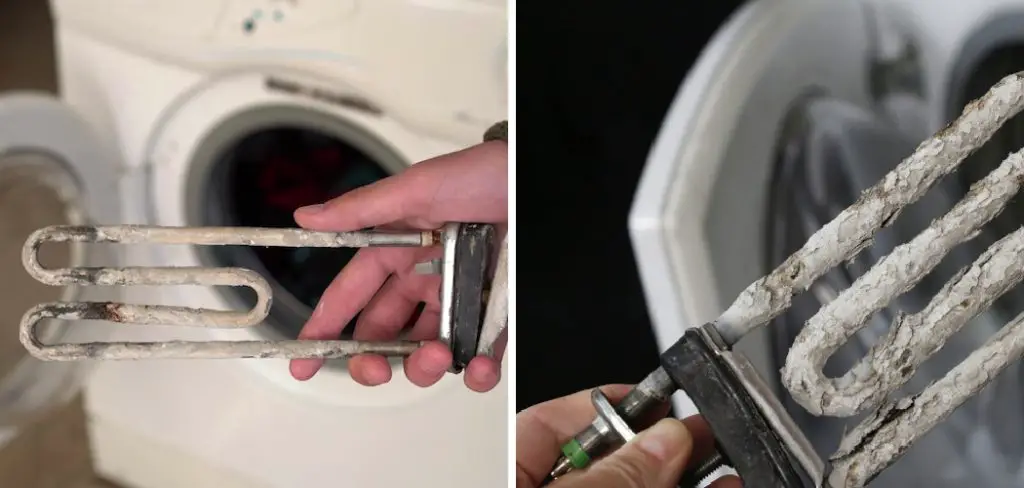
If you have struggled to keep your water heater in tip-top shape, this blog post is for you. This article will share a few tips and tricks for preventing calcium buildup in your water heater. Read on to learn how to prevent calcium buildup in water heater and keep it running smoothly for years.
Can You Prevent Calcium Buildup in Water Heater?
One of the most common issues with a water heater is the buildup of calcium, also known as scale. This buildup can cause damage to the water heater as well as negatively impact its efficiency. The good news is that there are steps you can take to prevent this buildup from occurring.
One option is to install a water softener to help remove minerals from the water before it enters the water heater. Another option is regularly flushing the water heater to remove accumulated sediment and minerals. By taking these preventative measures, you can extend the life of your water heater and reduce the likelihood of costly repairs.
Why Should You Prevent Calcium Buildup in Water Heater?
If you often use hot water in your daily routine, then your water heater is probably your best friend. But have you ever stopped to consider what might lurk inside that trusty appliance? Calcium buildup, or limescale, can be a serious issue in water heaters. As water is heated over time, minerals like calcium and magnesium can start to accumulate, forming a sort of crusty residue on the inside of the tank.
This can not only decrease the efficiency of your water heater, but it can also lead to costly repairs or even a complete breakdown. By taking the necessary steps to prevent calcium buildup, you can ensure that your water heater stays in top condition and continues to provide you with the hot water you need.
How to Prevent Calcium Buildup in Water Heater: 7 Tips and Tricks
1. Regular Flushing
Regular flushing is the most common and effective way to prevent calcium buildup in your water heater. You should flush the tank at least once a year to remove any sediment or calcium buildup that has accumulated inside. To do this, turn off the power supply, disconnect the water inlet and outlet valves, and drain the tank into a bucket. Remove any leftover sediments once the tank is empty by flushing it with water.

2. Use a Water Softener
Installing a water softener is another effective method to prevent calcium buildup in your water heater. Water softeners remove hardness-causing minerals, such as calcium and magnesium, from your water supply. The softer water that results from this will help reduce the buildup of sediments inside the water heater and prolong its lifespan.
3. Adjust the Temperature
Did you know that higher water temperatures can lead to faster mineral buildup in your water heater? That’s why keeping your heater’s temperature at an appropriate level is essential. The U.S. Department of Energy recommends setting your water heater temperature to 120 degrees Fahrenheit. Not only will this help prevent mineral buildup, but it will also reduce your energy bills and prevent scalding accidents.
4. Install a Water Filtration System
Installing a water filtration system is another way to prevent calcium buildup in your water heater. These systems work by removing impurities from your water supply, such as dirt, rust, and, of course, calcium. Removing these impurities can reduce the risk of mineral buildup inside your water heater and extend its lifespan.
5. Stay Vigilant
Preventing calcium buildup is an ongoing process, and it’s important to stay vigilant of your water heater’s condition. Occasionally inspect the tank for signs of sediment buildup and take prompt action when needed. Signs of sediment buildup include noises from the water heater, reduced hot water supply, and decreased efficiency. If you notice any of these signs, it’s time to take action to prevent further mineral buildup.
6. Use Distilled Water
Using distilled water in your water heater can also help prevent calcium buildup. Unlike tap water, distilled water is free from minerals that can cause sediment buildup inside the tank. However, using distilled water may not be practical for most households due to its cost and availability. You can, however, use it occasionally as a preventive measure.
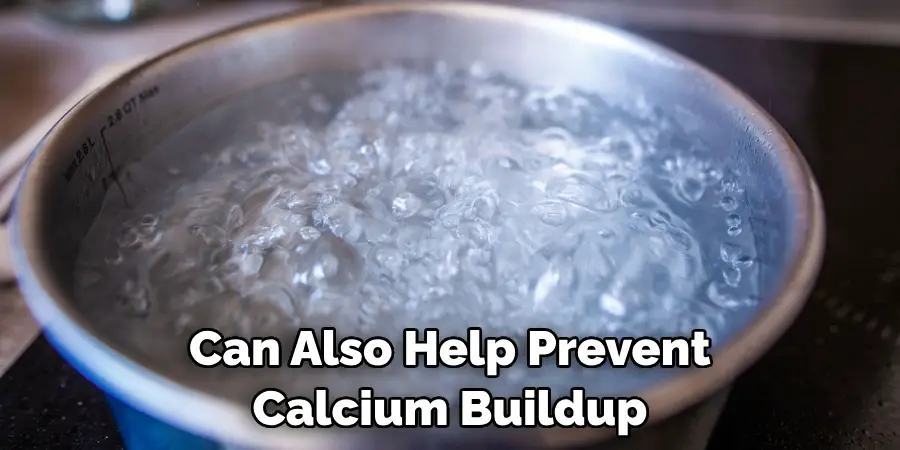
7. Consult a Professional
Always consult a professional plumber for advice on preventing calcium buildup in your water heater when in doubt. They have the expertise and experience to assess your situation and provide tailored solutions. They can also help with regular maintenance and flushing of your water heater to prevent mineral buildup.
Remember, prevention is always better than cure when maintaining your water heater and avoiding costly repairs. So follow these tips and keep your water heater running smoothly for years to come.
5 Considerations Things When You Need to Prevent Calcium Buildup in Water Heater
1. Regular Maintenance
One of the most important considerations for preventing calcium buildup in your water heater is to schedule regular maintenance. This includes draining and flushing the tank at least once a year to remove any sediment or buildup that may have accumulated. It’s also important to check the anode rod, which helps prevent corrosion and mineral buildup, and replace it if necessary.
2. Water Softener
Installing a water softener can also help prevent calcium buildup in your water heater. Water softeners use salt to remove minerals from the water, including calcium and magnesium, which are responsible for causing hard water and scale buildup. Using a water softener can reduce the amount of minerals entering your water heater and prolong its lifespan.
3. Temperature Settings
Another consideration for preventing calcium buildup is the temperature setting on your water heater. Higher temperatures can cause minerals to precipitate out of the water and form deposits inside the tank. It’s recommended to keep your water heater temperature at or below 120 degrees Fahrenheit to help prevent this issue.
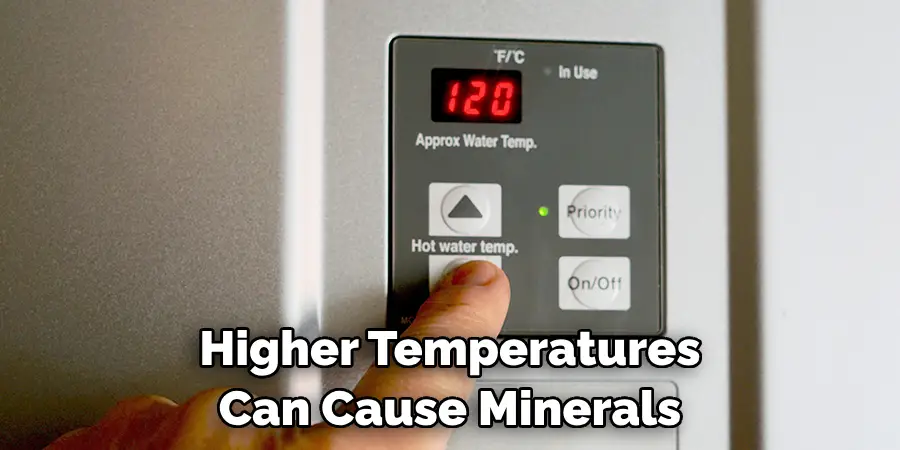
4. Water Quality
The quality of your home’s water supply can also play a role in preventing calcium buildup in your water heater. If you have hard water, which is high in mineral content, it’s more likely that you will experience calcium deposits in your tank. In this case, installing a whole-house filtration system or using a point-of-use filter for drinking and cooking can help reduce mineral levels.
5. Professional Help
If you’re experiencing severe calcium buildup in your water heater despite taking preventative measures, it may be time to seek professional help. A plumber can assess the situation and determine if any underlying issues with your plumbing system may be contributing to the problem. They may also recommend alternative solutions, such as installing a tankless water heater or upgrading to a larger capacity tank if necessary.
Benefits of Prevent Calcium Buildup in Water Heaters
Water heaters are essential appliances in our homes, providing us with a constant supply of warm water for showers and cleaning. However, these systems can experience issues such as calcium buildup over time, limiting their efficiency and lifespan. Regularly preventing calcium buildup can help to ensure that your water heater operates at its optimal level, saving you money on energy bills and potentially prolonging its lifespan.
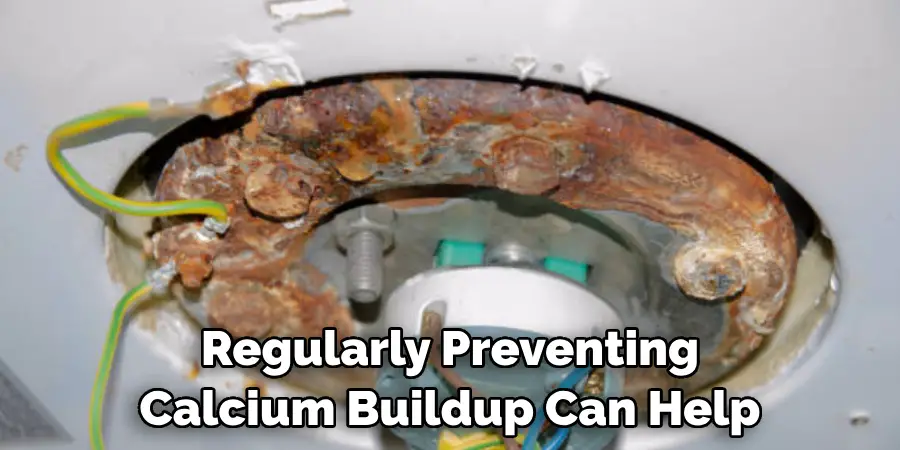
Furthermore, minimizing calcium buildup can help avoid unpleasant odors and tastes in your water, improving your overall water quality and quality of life. By taking the necessary steps to prevent calcium buildup in your water heater, you’ll reap numerous benefits and enjoy reliable access to hot water with less hassle and expense.
Some Common Mistakes People Make When Trying to Prevent Calcium Buildup in Water Heaters
Calcium buildup can be a source of frustration and damage in water heaters. People often try to prevent this buildup, yet many make some common mistakes in the process. One of these mistakes is turning up the temperature of the water heater. While this may provide a more efficient hot water supply, it can also accelerate calcium buildup. Another mistake is neglecting to flush the water heater regularly.
Over time, sediment and other minerals can accumulate in the tank, contributing to calcium buildup. It is also crucial to consider the quality of the water being supplied to the heater. Water high in minerals is more likely to produce buildup, so it may be necessary to look into filtration options. By avoiding these and other common mistakes, homeowners can better protect their water heaters and ensure they have a reliable hot water supply.
Conclusion
Preventing calcium buildup is critical for maintaining the efficiency and lifespan of your water heater. By following the tips and tricks outlined in this article, you can extend the life of your water heater and protect yourself from costly repairs down the road. Regular flushing, installing a water softener, adjusting the temperature, installing a water filtration system, and staying vigilant of the tank’s condition are all effective ways to stay on top of calcium buildup.
We hope these tips will help you keep your water heater in excellent condition for years. Thanks for reading our post about how to prevent calcium buildup in water heater.

